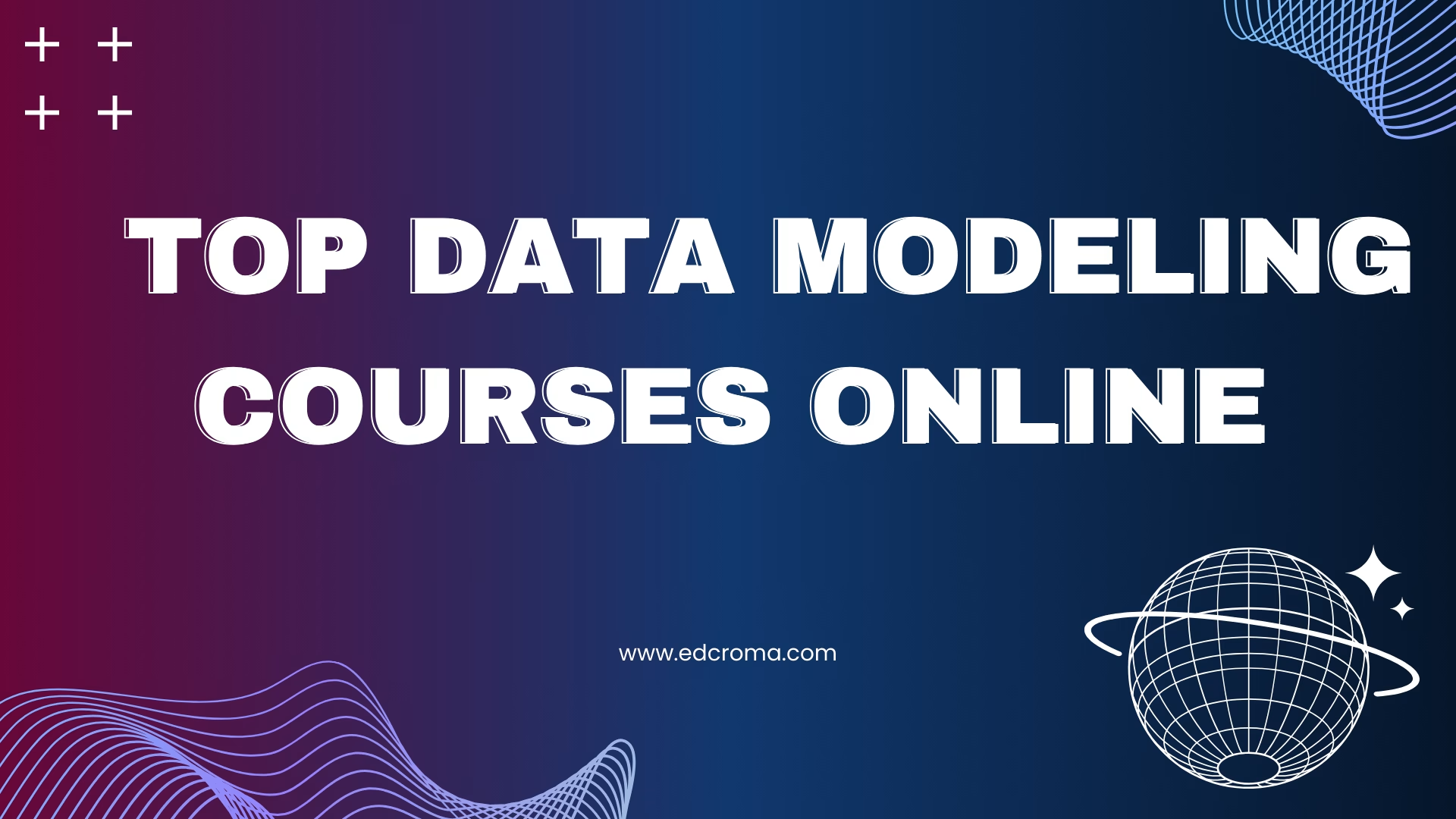Top Data Modeling Courses Online | Beginner to Advanced

In today’s data-driven world, data modeling plays a crucial role in helping organizations structure their data for better analysis, decision-making, and performance. Data modeling serves as the foundation of efficient database systems, providing a blueprint for organizing and managing data. Whether you are a beginner or a seasoned professional looking to refine your skills, learning data modeling can significantly enhance your career prospects.
This blog explores the top online data modeling courses, ranging from beginner to advanced levels, and explains why mastering this skill is essential in the data science and IT landscape.
What is Data Modeling?
Data modeling is the process of creating a conceptual, logical, or physical representation of data. It defines the relationships, rules, and structures that govern how data is stored and retrieved in databases. A well-designed data model ensures that data is consistent, reliable, and easy to access.
Types of Data Models
- Conceptual Data Model: High-level design focusing on the data’s purpose and overall structure.
- Logical Data Model: Describes the data elements, relationships, and constraints in detail.
- Physical Data Model: Specifies the physical storage details, such as database tables and indexes.
Data modeling is widely used in database design, software development, business intelligence, and data analytics.
Why Learn Data Modeling?
1. Better Database Design
Data modeling enables you to design databases that are efficient, scalable, and aligned with business requirements.
2. Enhanced Data Analysis
A structured data model improves data analysis by ensuring that data is clean and accessible.
3. Improved Decision-Making
With a well-designed data model, businesses can make faster and more accurate decisions based on reliable data.
4. Career Opportunities
Data modeling skills are in high demand across industries, from IT and finance to healthcare and retail. Roles like data architect, database administrator, and business analyst require expertise in data modeling.
Explore Data Modeling Courses at EdCroma and take the first step toward mastering this critical skill.
Top Data Modeling Courses Online
Here’s a list of the best data modeling courses available online, catering to beginners, intermediates, and advanced learners:
1. Data Modeling for Beginners by Udemy
- Level: Beginner
- Duration: 4 hours
- What You’ll Learn:
- Basics of data modeling
- Understanding ER diagrams and relationships
- Designing databases using conceptual and logical models
- Why Choose This Course?:
Ideal for beginners, this course simplifies data modeling concepts and includes practical exercises.
2. Data Modeling Certification Training by EdCroma
- Level: Beginner to Advanced
- Duration: Self-paced
- What You’ll Learn:
- End-to-end data modeling process
- Creating and analyzing conceptual, logical, and physical models
- Advanced modeling techniques for complex databases
- Why EdCroma?:
EdCroma’s course offers a hands-on approach, featuring industry projects and personalized mentoring to help learners gain real-world expertise.
3. Advanced Data Modeling by LinkedIn Learning
- Level: Intermediate to Advanced
- Duration: 5 hours
- What You’ll Learn:
- Advanced concepts in data modeling, such as normalization and denormalization
- Designing multi-dimensional models for data warehouses
- Practical applications of data modeling in business intelligence
- Why Choose This Course?:
Best for professionals looking to elevate their data modeling skills with advanced techniques.
4. Data Warehouse Concepts, Design, and Data Integration by Coursera
- Level: Beginner to Intermediate
- Duration: 6 weeks
- What You’ll Learn:
- Basics of data warehousing and integration
- Data modeling for business intelligence systems
- ETL processes and tools
- Why Choose This Course?:
This course offers a balanced mix of theory and practical applications, making it ideal for aspiring data warehouse architects.
Get a comprehensive overview of Data Modeling from Wikipedia.
5. Dimensional Data Modeling by Pluralsight
- Level: Intermediate
- Duration: 3 hours
- What You’ll Learn:
- Understanding star and snowflake schemas
- Designing dimensional models for reporting and analytics
- Working with OLAP systems
- Why Choose This Course?:
Focused on data warehousing, this course is perfect for those looking to specialize in analytics and reporting.
6. Mastering Data Modeling Fundamentals by Simplilearn
- Level: Beginner to Intermediate
- Duration: 2 months
- What You’ll Learn:
- Data modeling principles and methodologies
- Data governance and compliance in database design
- Practical projects and case studies
- Why Choose This Course?:
Simplilearn’s course emphasizes practical learning through real-world projects.
7. Learn Data Modeling by DataCamp
- Level: Beginner
- Duration: 3 hours
- What You’ll Learn:
- Basics of data modeling and normalization
- Identifying relationships and attributes in datasets
- Designing database schemas
- Why Choose This Course?:
A beginner-friendly course with interactive exercises and real-time feedback.
8. Data Modeling Bootcamp by EdCroma
- Level: All Levels
- Duration: 6 months
- What You’ll Learn:
- Comprehensive coverage of data modeling techniques
- Working with tools like ER/Studio, PowerDesigner, and Lucidchart
- Advanced case studies and projects
- Why EdCroma?:
EdCroma offers industry-focused training and a globally recognized certification, making it a preferred choice for learners.
Explore the background of Data Modeling on Linkedin.
How to Choose the Right Data Modeling Course?
1. Assess Your Skill Level
- Beginners should start with courses that cover the fundamentals.
- Professionals with experience can opt for advanced courses to refine their expertise.
2. Look for Hands-On Training
Choose courses that include practical exercises, projects, and case studies.
3. Check Course Content
Ensure the course covers essential topics like ER diagrams, normalization, dimensional modeling, and database optimization.
4. Evaluate Certification
Courses with recognized certifications can enhance your resume and career prospects.
5. Flexibility
Opt for a course that fits your schedule, whether it’s self-paced or instructor-led.
Benefits of Choosing EdCroma for Data Modeling Training
At EdCroma, we pride ourselves on delivering industry-relevant training that equips learners with the skills they need to excel in the field.
- Experienced Instructors: Learn from industry experts with years of experience in data modeling.
- Real-World Projects: Gain hands-on experience with projects that reflect real-world challenges.
- Flexible Learning Options: Choose between self-paced and instructor-led formats.
- Recognized Certifications: Add value to your professional profile with globally acknowledged certifications.
- Career Support: Access mentorship and career guidance to achieve your professional goals.
Explore Data Modeling Courses at EdCroma and take the first step toward mastering this critical skill.
Career Opportunities in Data Modeling
Mastering data modeling opens doors to a wide range of roles in various industries:
- Data Architect: Designing and implementing enterprise data solutions.
- Database Administrator: Managing and optimizing databases for performance.
- Business Analyst: Analyzing data models to support business strategies.
- Data Engineer: Developing robust data pipelines and storage solutions.
Final Thoughts
Whether you’re a novice exploring the world of data or an experienced professional aiming to enhance your skillset, mastering data modeling is an invaluable asset in today’s data-driven economy. The online courses mentioned above provide comprehensive training tailored to your needs, helping you unlock opportunities in the competitive field of data science and IT.
Choose the right data modeling course to enhance your career and ensure you have the tools and knowledge to excel. Start your learning journey with EdCroma, where industry-relevant training meets practical expertise.
FAQs
1. What is data modeling, and why is it important?
Data modeling is the process of creating a structured representation of data to organize, store, and retrieve it efficiently. It’s important because it ensures data consistency, improves database design, and supports better decision-making in businesses.
2. Who should take a data modeling course?
Data modeling courses are suitable for:
- Beginners interested in data-related careers.
- Professionals like data scientists, database administrators, business analysts, and software developers looking to enhance their skills.
- IT professionals aiming to specialize in database design and data architecture.
3. What are the prerequisites for learning data modeling?
For beginner courses, no prior knowledge is required. However, familiarity with databases, SQL, and basic data concepts can be helpful for intermediate and advanced courses.
4. How long does it take to complete a data modeling course?
Course duration varies depending on the level:
- Beginner courses: 3–6 hours.
- Intermediate courses: 1–2 weeks.
- Advanced programs: 1–3 months.
Self-paced courses allow you to learn at your own convenience.
5. What tools are commonly used in data modeling?
Popular tools include:
- ER/Studio
- PowerDesigner
- Lucidchart
- Microsoft Visio
- Toad Data Modeler
These tools help in designing and visualizing data models effectively.
6. Can I learn data modeling online?
Yes! Numerous platforms like EdCroma, Udemy, Coursera, LinkedIn Learning, and DataCamp offer online data modeling courses, ranging from beginner to advanced levels.
7. What certifications are available for data modeling?
Many courses offer certifications upon completion. Certifications from platforms like EdCroma and recognized universities enhance your professional profile and demonstrate your expertise to employers.
8. How much do data modeling courses cost?
The cost depends on the platform and course level:
- Beginner courses: $20–$100.
- Intermediate to advanced courses: $200–$1000.
Some platforms also offer free trials or scholarships.
9. What are the career prospects after completing a data modeling course?
Career opportunities include roles such as:
- Data Architect
- Database Administrator
- Data Engineer
- Business Analyst
- BI Specialist
These roles are highly in demand across industries like IT, finance, healthcare, and retail.
10. Why choose EdCroma for data modeling courses?
EdCroma offers industry-focused courses with hands-on projects, expert instructors, and globally recognized certifications. With flexible learning options and career support, EdCroma ensures you’re well-prepared for real-world challenges.
11. Can I transition to data modeling from a non-technical background?
Yes, many beginner-friendly courses cover fundamental concepts in an easy-to-understand way, allowing non-technical learners to transition into data modeling.
12. How can I practice data modeling skills?
Practice by:
- Designing data models for hypothetical business scenarios.
- Using tools like Lucidchart or PowerDesigner to create ER diagrams.
- Enrolling in hands-on courses like those offered by EdCroma that include real-world projects.
13. Are data modeling and data visualization the same?
No. Data modeling focuses on structuring data for storage and retrieval, while data visualization involves representing data insights graphically to aid decision-making.
14. Is coding knowledge required for data modeling?
Basic coding skills, especially in SQL, are beneficial but not always mandatory. Many tools simplify the process, allowing non-programmers to create data models.
15. How do I choose the right data modeling course?
Consider your skill level, career goals, and learning preferences. Look for courses that include practical training, certifications, and flexible schedules. Platforms like EdCroma offer beginner-to-advanced courses tailored to individual needs.




